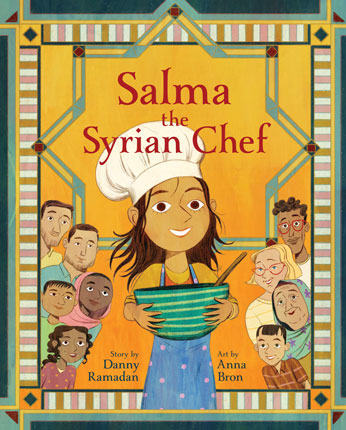Full Text Reviews: Booklist - 03/15/2020 *Starred Review* Salma’s Mama hasn’t truly smiled since they left their Syrian refugee camp and separated from Papa. Hoping to cheer her up, Salma attempts to cook one of Mama’s favorite dishes—foul shami, a sort of fava bean salad. With the help of a wonderfully diverse array of other Vancouver Welcome Center residents—kids from Egypt, India, Venezuela, Somalia; a Jordanian translator; a gay Lebanese couple; a Persian granny—Salma overcomes her rough English, a shortage of spices, and a broken bottle of olive oil before surprising Mama, who finally “breaks into a long, sweet laugh, like the echo of bells.” In his picture-book debut, activist, author, and former refugee Ramadan builds a heartfelt story of culture, community, and love around the Syrian crisis. Grown readers will recognize Mama’s quiet struggle to persevere, even as the story focalizes—appropriately—on Salma’s endearing, somewhat naive tween perspective. Tight prose shines through poetic use of simile and a dedication to narrative, with Bron’s art bringing the text’s humanity to life, eking out so much emotion—Mama’s fatigue; Salma’s hope, frustration, and elation—through simple strokes of facial expression. The Vancouver setting is bright and colorful, and most illustrations come framed in geometric patterns, maintaining an Arabic aesthetic in this refugee family’s new life. A jovial blend of food, family, and friends. - Copyright 2020 Booklist. School Library Journal - 04/01/2020 K-Gr 2—Salma lives with her mother in a refugee center in Canada, hoping her father will join them. Salma misses her father and the life in Syria, and struggles seeing how unhappy her mother is. Determined to hear her mother laugh again, Salma tries to cheer her up with silly drawings and jokes, "but all she gets is Mama's sad smile, full of love but empty of joy." Remembering the last time she saw her mother happy, Salma decides to surprise her by making foul shami, a Syrian meal her family shared in their lost home. Salma seeks the help of many other people in the refugee camp to find a recipe, translate the foods, shop, and prepare the meal, showcasing the things all the immigrants have in common as well as the variety and uniqueness of the cultures. Despite all the help, Salma doesn't have the right spices to finish her dish, and her frustration opens a floodgate for all her feelings of displacement and sadness. The meal, of course, delights her mother, and their friends at the camp join them with the missing ingredients. The charming illustrations are notably framed by Syrian mosaic patterns, providing a beautiful framework for the story. Realistically, the happy ending is limited to the connection with her mother and a dream of continued happiness with their new community; no easy answers about the future are provided. VERDICT Truthful, hopeful, and relatable; a first purchase.—Anna Haase Krueger, Ramsey County Library, MN - Copyright 2020 Publishers Weekly, Library Journal and/or School Library Journal used with permission. Booklist - 03/15/2020 *Starred Review* Salma’s Mama hasn’t truly smiled since they left their Syrian refugee camp and separated from Papa. Hoping to cheer her up, Salma attempts to cook one of Mama’s favorite dishes—foul shami, a sort of fava bean salad. With the help of a wonderfully diverse array of other Vancouver Welcome Center residents—kids from Egypt, India, Venezuela, Somalia; a Jordanian translator; a gay Lebanese couple; a Persian granny—Salma overcomes her rough English, a shortage of spices, and a broken bottle of olive oil before surprising Mama, who finally “breaks into a long, sweet laugh, like the echo of bells.” In his picture-book debut, activist, author, and former refugee Ramadan builds a heartfelt story of culture, community, and love around the Syrian crisis. Grown readers will recognize Mama’s quiet struggle to persevere, even as the story focalizes—appropriately—on Salma’s endearing, somewhat naive tween perspective. Tight prose shines through poetic use of simile and a dedication to narrative, with Bron’s art bringing the text’s humanity to life, eking out so much emotion—Mama’s fatigue; Salma’s hope, frustration, and elation—through simple strokes of facial expression. The Vancouver setting is bright and colorful, and most illustrations come framed in geometric patterns, maintaining an Arabic aesthetic in this refugee family’s new life. A jovial blend of food, family, and friends. - Copyright 2020 Booklist. School Library Journal - 04/01/2020 K-Gr 2—Salma lives with her mother in a refugee center in Canada, hoping her father will join them. Salma misses her father and the life in Syria, and struggles seeing how unhappy her mother is. Determined to hear her mother laugh again, Salma tries to cheer her up with silly drawings and jokes, "but all she gets is Mama's sad smile, full of love but empty of joy." Remembering the last time she saw her mother happy, Salma decides to surprise her by making foul shami, a Syrian meal her family shared in their lost home. Salma seeks the help of many other people in the refugee camp to find a recipe, translate the foods, shop, and prepare the meal, showcasing the things all the immigrants have in common as well as the variety and uniqueness of the cultures. Despite all the help, Salma doesn't have the right spices to finish her dish, and her frustration opens a floodgate for all her feelings of displacement and sadness. The meal, of course, delights her mother, and their friends at the camp join them with the missing ingredients. The charming illustrations are notably framed by Syrian mosaic patterns, providing a beautiful framework for the story. Realistically, the happy ending is limited to the connection with her mother and a dream of continued happiness with their new community; no easy answers about the future are provided. VERDICT Truthful, hopeful, and relatable; a first purchase.—Anna Haase Krueger, Ramsey County Library, MN - Copyright 2020 Publishers Weekly, Library Journal and/or School Library Journal used with permission. Loading...
|



